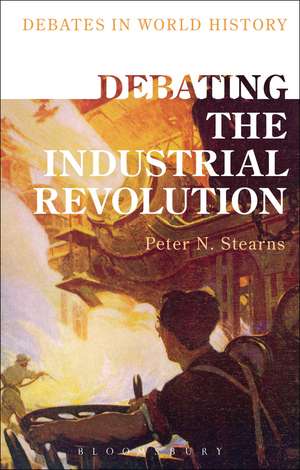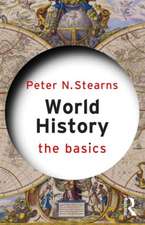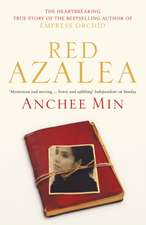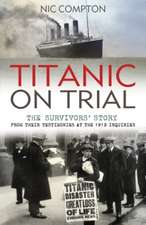Debating the Industrial Revolution: Debates in World History
Autor Professor Peter N. Stearnsen Limba Engleză Paperback – 21 oct 2015
| Toate formatele și edițiile | Preț | Express |
|---|---|---|
| Paperback (1) | 144.15 lei 6-8 săpt. | |
| Bloomsbury Publishing – 21 oct 2015 | 144.15 lei 6-8 săpt. | |
| Hardback (1) | 535.90 lei 6-8 săpt. | |
| Bloomsbury Publishing – 21 oct 2015 | 535.90 lei 6-8 săpt. |
Preț: 144.15 lei
Preț vechi: 178.27 lei
-19% Nou
Puncte Express: 216
Preț estimativ în valută:
27.58€ • 29.50$ • 22.100£
27.58€ • 29.50$ • 22.100£
Carte tipărită la comandă
Livrare economică 17 aprilie-01 mai
Preluare comenzi: 021 569.72.76
Specificații
ISBN-13: 9781472589354
ISBN-10: 1472589351
Pagini: 160
Dimensiuni: 138 x 216 x 10 mm
Greutate: 0.21 kg
Editura: Bloomsbury Publishing
Colecția Bloomsbury Academic
Seria Debates in World History
Locul publicării:London, United Kingdom
ISBN-10: 1472589351
Pagini: 160
Dimensiuni: 138 x 216 x 10 mm
Greutate: 0.21 kg
Editura: Bloomsbury Publishing
Colecția Bloomsbury Academic
Seria Debates in World History
Locul publicării:London, United Kingdom
Caracteristici
This is the first book of its kind to take a historiographical approach to the industrial revolution, introducing the key historical debates rather than attempting to cover the enormous history of global industrialization
Notă biografică
Peter N. Stearns is Professor of History at George Mason University, USA. A leading expert on world history, he has authored and edited numerous acclaimed books, including The Encyclopedia of World History (2001), Globalization in World History (2009) and World Civilizations: The Global Experience (2006).
Cuprins
1. Introduction: Nature and Significance of the Debates2. Defining the Industrial Revolution3. Early Explanations4. Expanding the Analysis5. A More Global Perspective6. Conclusion: The Current Status of DebateBibliographyIndex
Recenzii
Intended for use in classrooms, priced reasonably, and written at a level accessible to an American college freshman, Debating the Industrial Revolution by Peter Stearns serves both process- and content-related purposes. Each chapter addresses major "debates" about industrialization-the role of natural resources, for instance, or of proto-industrialization, or of individuals in helping to advance social and economic transformation. Simultaneously, Stearns introduces such basic elements of historical process as determining the difference between correlation and causation, understanding quantitative versus qualitative arguments, and attempting to recognize that historians' biases may influence their ability to fairly consider interpretive questions.
Debating the Industrial Revolution asks the right questions. Firmly rooted in the British case and its European context, but engaging the process of industrialization, this work is appropriate for global history courses. Peter Stearns formulates easy-to-understand questions based on complex issues of historical causation and economic development. By emphasizing the multiple linkages between political power and economics as well as the vital role of individuals, Stearns encourages students to interrogate the problem of industrialization comparatively and to formulate their own approaches to answering the key questions posed here.
Forget the old textbooks that bored students and other readers witless with endless statistics and indecipherable economic theory. This new book captures the debates about a venerable topic, the British Industrial Revolution, in an engaging and open-ended way. At each step we are captivated by Peter Stearns' breadth of his reading, the acuity of his summaries, and the lack of condescension as he suggests why historians might have followed one path or another, only to meet problems of evidence or coherence that then took them in yet new directions.
No one has written about the rise and spread of industrialization on a global scale as perceptively and as rigorously comparatively as Peter Stearns. This concise overview of one of the most pivotal processes in all of human history raises the key questions, considers the major debates, and explores the diverse consequences for societies and states that are relevant, and increasingly urgent, for the present and future of our troubled planet.
Debating the Industrial Revolution asks the right questions. Firmly rooted in the British case and its European context, but engaging the process of industrialization, this work is appropriate for global history courses. Peter Stearns formulates easy-to-understand questions based on complex issues of historical causation and economic development. By emphasizing the multiple linkages between political power and economics as well as the vital role of individuals, Stearns encourages students to interrogate the problem of industrialization comparatively and to formulate their own approaches to answering the key questions posed here.
Forget the old textbooks that bored students and other readers witless with endless statistics and indecipherable economic theory. This new book captures the debates about a venerable topic, the British Industrial Revolution, in an engaging and open-ended way. At each step we are captivated by Peter Stearns' breadth of his reading, the acuity of his summaries, and the lack of condescension as he suggests why historians might have followed one path or another, only to meet problems of evidence or coherence that then took them in yet new directions.
No one has written about the rise and spread of industrialization on a global scale as perceptively and as rigorously comparatively as Peter Stearns. This concise overview of one of the most pivotal processes in all of human history raises the key questions, considers the major debates, and explores the diverse consequences for societies and states that are relevant, and increasingly urgent, for the present and future of our troubled planet.














